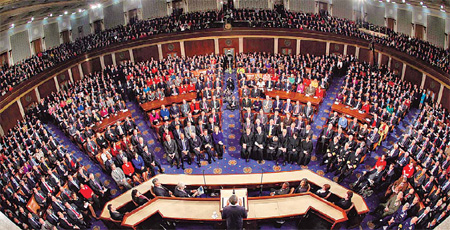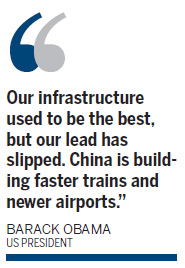China-US
Speech focuses on economy
Updated: 2011-01-27 08:45
By Wu Jiao and Ai Yang (China Daily)
Analysts say the goals set out in the address could lead to stronger US-China cooperation
 |
|
US President Barack Obama delivers his State of the Union address in Washington on Tuesday. [Photo/Agencies] |
BEIJING / NEW YORK - The economic goals set out in US President Barack Obama's State of the Union address may create more opportunities for cooperation between China and the United States, analysts said.
But they also warned that the US' more ambitious export and job goals may mean tighter trade laws that will pressure China's currency and trade policies.
With the US leader looking to the 2012 presidential election, Obama's key annual speech focused overwhelmingly on the economy, with foreign policy taking a backseat.
| ||||
He said that India and China are now providing more math and science education to their children to ensure long-lasting competitiveness.
"Our infrastructure used to be the best, but our lead has slipped," said Obama, noting that "China is building faster trains and newer airports".
Obama also sought to rally Americans by comparing the challenge of competing with emerging economic giants such as China and India to the US space race with the Soviet Union in the 1950s and 1960s.
"We need to out-innovate, out-educate and out-build the rest of the world" to enjoy a better position and compete for jobs and industries globally, he said.
He also cited export agreements recently signed with China creating as many as 235,000, according to figures he released during last week's state visit by President Hu Jintao.
Tuesday's speech was a key element of the Obama administration's campaign to win over voters ahead of the 2012 election, said observers.
"The US has gone through the darkest moment of the financial crisis. But the road to recovery is not easy," Fu Mengzi, assistant president and a research professor with the China Institutes of Contemporary International Relations, told China Daily.
"China was mentioned in the speech as a positive example, and to us this is recognition and an important change.
"Washington has realized and admitted that the world is changing fast, and the US is sometimes left behind for example in terms of certain technologies, and the advantages it once held are no longer there," Fu said.
"Obama mentioned that China became home to the world's largest private solar research facility, and this means there is great potential for cooperation that could be tapped into in the future," he said.
However, Fu said these opportunities will be accompanied by increased pressures. "The appreciation of the yuan may be further stressed now that the US aims to double its export over the next few years ... but on the other hand we can also play an active role by exporting and increasing investment," Fu said.
"Conflicts will certainly continue to exist," said He Weiwen, a council member of the China Society for American Economic Study, a Beijing-based think tank.
"Since it was more focused on domestic issues, Obama's speech did not elaborate on policies toward China or any other country, but we will have to closely watch future government reports on trade regulations and rules. It is possible that there may be more IPR disputes as China becomes increasingly successful in high-tech development," He said.
Analysts said that some of the goals set out by Obama might lead to more opportunities for China and the US to cooperate, even though the US identified China and India as countries to challenge.
"It is the fact that China and India still have a long way to go before competing with the US, which has a scientific investment far larger than China, said Zhou Shijian, a senior expert at the Center for US-China Relations at Tsinghua University.
|
|
China's aim to boost its imports is in line with Obama's goal to double US exports, yet what China needs is US civilian high-technology.
"If the US eases its controls on high-tech exports to China, as it has done with India, China will become the top export market for the US during the next five to 10 years," said Zhou.
However, He Weiwen dismissed such a possibility in the near future.
"We would see regulation easing in individual cases, but it's unlikely to see its overall policy change drastically," he said.
Obama's concerns about US competitiveness are justified, according to Sebastian Mallaby, director of the Maurice R. Greenberg Center for Geoeconomic Studies and Paul A. Volcker Senior Fellow for International Economics at the Council on Foreign Relations.
Even before the financial crisis, growth in the US had been slowing for demographic and other reasons, while younger emerging economies were powering ahead, according to Mallaby.
In 2002 and 2008, more than 85 percent of developing economies outgrew the US. Between 1960 and 2000, less than one in three developing countries did so. Now, in the wake of the financial crisis, the United States finds itself in an even weaker relative position, Mallaby said.
Chen Weihua in New York and Wang Di in Beijing contributed to this story.
Specials

President Hu visits the US
President Hu Jintao is on a state visit to the US from Jan 18 to 21.

Ancient life
The discovery of the fossile of a female pterosaur nicknamed as Mrs T and her un-laid egg are shedding new light on ancient mysteries.

Economic Figures
China's GDP growth jumped 10.3 percent year-on-year in 2010, boosted by a faster-than-expected 9.8 percent expansion in the fourth quarter.




